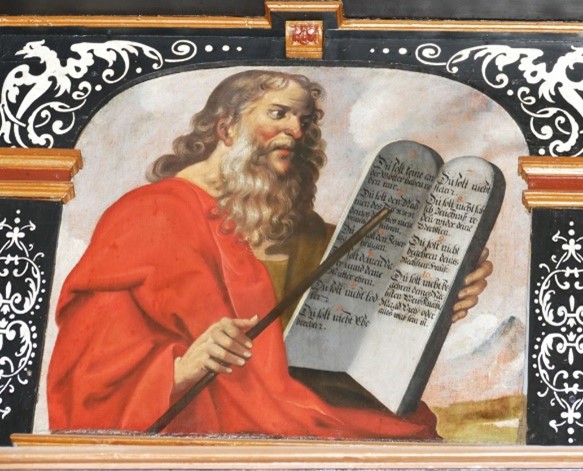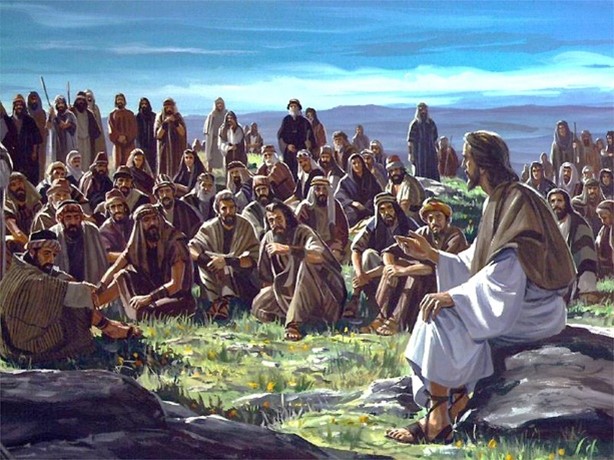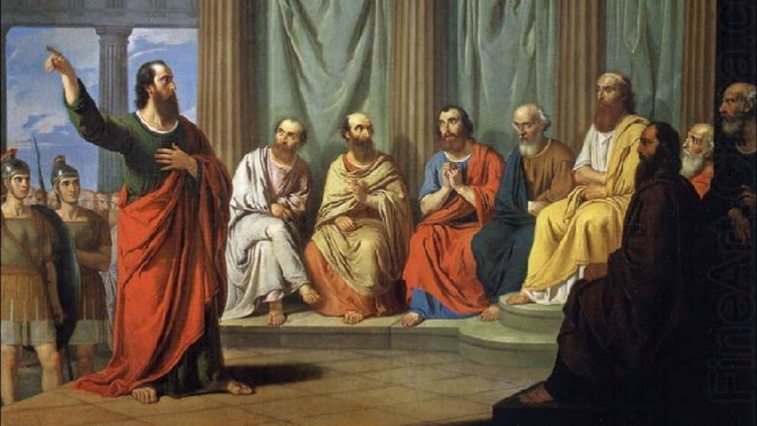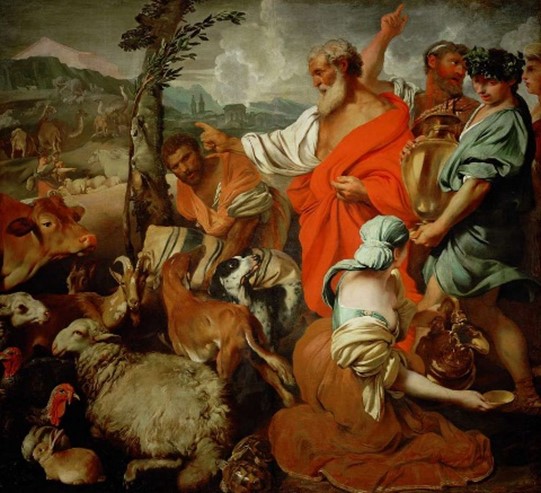Introduction to Christianity with Luke
Chapter 13
Hi, welcome to my Introduction to Christianity with Luke. I’m Brent Clark. In chapter thirteen, we learn about:
- Repentance
- It takes time to improve
- The idolatry of religious rules
- What laws must Christians observe?
 Luke 13:1-5: Jesus tells people to turn to God and repent
Luke 13:1-5: Jesus tells people to turn to God and repent
I love how the GOD’S WORD Translation replaces the word repent with “change the way they think and act”.
 Some claim it’s a Roman military term, used when the drill sergeant commands the troops to turn 180° to face the opposite way. I once took my home Bible study group outside on our large deck to do some marching drill: “Left. Right. Left. Right. … Halt. Repent. Left. Right…” It was a fun excursion and a lesson they’d not forget. It turns out this is historically incorrect, but it’s a handy picture.
Some claim it’s a Roman military term, used when the drill sergeant commands the troops to turn 180° to face the opposite way. I once took my home Bible study group outside on our large deck to do some marching drill: “Left. Right. Left. Right. … Halt. Repent. Left. Right…” It was a fun excursion and a lesson they’d not forget. It turns out this is historically incorrect, but it’s a handy picture.
Repentance seems to have a stigma like “Oooo, they’ve been bad”. But I see that repentance needs to be a lifestyle. It shouldn’t be a big deal and it should become natural as we mature as Christians. Often in life, we need to repent or “change the way we think and act”. For example, someone diagnosed with diabetes has to drastically change their diet. Or someone who’s had a heart attack. Repentance is a good thing. It improves our lives and health. This applies to our spiritual life too. A few years ago, I suffered a burnout and had to walk out on work for a couple of weeks sick leave. I saw a counsellor, who saw that I was very busy and advised me to cut back on commitments and take a Sabbath like the Jews do.
Exodus 20:8 “Remember the day of rest by observing it as a holy day. 9You have six days to do all your work. 10The seventh day is the day of rest—a holy day dedicated to the Lord your God. You, your sons, your daughters, your male and female slaves, your cattle, and the foreigners living in your city must never do any work ⌞on that day⌟. 11In six days the Lord made heaven, earth, and the sea, along with everything in them. He didn’t work on the seventh day. That’s why the Lord blessed the day he stopped his work and set this day apart as holy.
Jesus had a few things to say about the Pharisees’ extremely legalistic definition of “work”. For me, I don’t do a Sabbath as a religious obligation, but as a weekly mental health day.
Growing up as a Christian, on Sundays, I’d quite religiously avoid any regular work, but the day would be filled with God’s work with church activities. I never actually rested. As a lay-minister, Sundays isn’t a day of rest, so it made sense to follow the Jewish timing. For the Sabbath, I avoid appointments, regular work, projects, and study. Ideally, I should spend time with family. I take long baths and walks, read a book, go for a casual bike ride, or watch a movie. Sometimes I get bored, and I think that means I’m doing it right. I once played a computer game to fill the afternoon and got up feeling drained and thinking I need to limit that to an hour or so.
After several weeks, I found that I had so much more energy to do things. I would push myself to get things done because I can rest on Saturday. It feels like a form of fasting, sacrificing my Saturdays to rest. I just have to get those Saturday jobs done during the evenings. But my mental health seems to be perfect for the first time in my life.
Anyways, let’s get back to repentance. We don’t just repent once when we choose to follow Jesus, but gradually, the Holy Spirit prompts us to make changes in our lives – to give up that one thing that’s holding back our spiritual growth, or to make a change to take the next step. God might prompt us to give up smoking, or marry the person we’re sleeping with, or commit to a particular service, Bible study or prayer. If he does, that’s a good sign that you care about this relationship with him and you’re growing as a Christian.
 Luke 13:6-8: A story about a fruitless tree
Luke 13:6-8: A story about a fruitless tree

I think this shows the tension between God’s desire for us to produce disciples and God’s patience with us to take time to mature. We’re similar. We expect people and ourselves to be perfect immediately. But the fact is, it’s a journey that takes time. God’s patient with us, so we should be too. Don’t beat yourself up because you’re not immediately perfect.
 Luke 13:10-17: Jesus heals a disabled woman
Luke 13:10-17: Jesus heals a disabled woman
I just talked about Jesus’ confrontations with the Pharisees’ oppressively legalistic definition of “work” in regards to the Sabbath. They so idolized the rules that they lost the intention for the Sabbath to be a day of restoration.

 Luke 13:18-21: Stories about a mustard seed and yeast
Luke 13:18-21: Stories about a mustard seed and yeast
Often, we feel like our faith is so puny, it’s useless. Jesus shows that tiny little things grow into something huge.


 Luke 13:22-30: The narrow door
Luke 13:22-30: The narrow door

As I’m writing this, I’m chatting with a religious Jew I was just introduced to on WhatsApp. Modern Judaism is rooted in the Pharisees’ teachings. They try so hard to be holy and follow all the rules, believing that’s the way into Heaven. Many people are looking in many different ways for the ultimate meaning and fulfilment of life. Many are even dedicating their life to serving in their church but have not come to know Jesus personally. Once the door closes on this life, and they stand before Jesus as their judge, they’ll see other familiar people entering Heaven, but they’ll be thrown out.
 Luke 13:31-35: Jesus warns Jerusalem
Luke 13:31-35: Jesus warns Jerusalem
 It’s interesting that Jesus contrasts the third day and the day after tomorrow. He’s referring to his resurrection on the third day after his death. But he’s also talking about his return in the third millennia after his first coming. When Jesus returns at the end of the apocalypse, he’ll bring restoration to this world.
It’s interesting that Jesus contrasts the third day and the day after tomorrow. He’s referring to his resurrection on the third day after his death. But he’s also talking about his return in the third millennia after his first coming. When Jesus returns at the end of the apocalypse, he’ll bring restoration to this world.
Jesus then talks about the coming destruction of Jerusalem in 70AD, 40 years later. We can still see the stones that the Roman soldiers threw down from the Temple.
 What laws must Christians observe?
What laws must Christians observe?
 Humans have a natural desire for the law. The law is like donuts (do nots). We all like donuts, but they don’t really help us. They’re tasty and fill us up, but really don’t have much nutritional value. We want to know black on white what’s right and what’s not. Then when that’s understood, we want to find loopholes to justify our shortcomings. The Pharisees were the epitome of this.
Humans have a natural desire for the law. The law is like donuts (do nots). We all like donuts, but they don’t really help us. They’re tasty and fill us up, but really don’t have much nutritional value. We want to know black on white what’s right and what’s not. Then when that’s understood, we want to find loopholes to justify our shortcomings. The Pharisees were the epitome of this.
It’s normal for people to ask, what laws must Christians observe? Do we have to worship like this? Should we be worshipping on Saturday like the Jews? Should we observe the Jewish festivals? Should we be circumcised? Do we have to pay a tenth of our income to our church? Is that gross or net? Is it ok to eat bacon? Can I marry my cousin? Is it ok to have two wives?
However, such questions may be exposing a focus on the law, instead of grace and relationship with God.
Adam
 Back in Eden, it was simple,
Back in Eden, it was simple,
Genesis 1:28 God blessed them and said, “Be fertile, increase in number, fill the earth, and be its master. Rule the fish in the sea, the birds in the sky, and all the animals that crawl on the earth.”
So have lots of babies so the whole Earth may be managed well.
Genesis 2:16 The Lord God commanded the man. He said, “You are free to eat from any tree in the garden. 17But you must never eat from the tree of the knowledge of good and evil because when you eat from it, you will certainly die.”
So, here’s the first donut (do not). Adam didn’t understand good and evil. He lived in a perfect world where everything was “very good”. There was no evil – not until he unleashed it by eating of the fruit. Then he knew – as he’d unleashed pandora’s box upon all creation. (The Greeks remember the first woman, Pandora, who came with a box she should never open).
It sort of seems like knowing this law led to the temptation to break it. Then we understood good and evil.
Noah
 When Noah stepped off the ark, God extended his initial command:
When Noah stepped off the ark, God extended his initial command:
Genesis 9 :3 Everything that lives and moves will be your food. I gave you green plants as food; I now give you everything else. 4But you are not to eat meat with blood in it. (Blood is life.) 5In addition, I will demand your blood for your life. I will demand it from any animal or from any person. I will demand the life of any person [who kills] another person. 6Whoever sheds human blood, by humans his blood will be shed, because in the image of God, God made humans. Jewish tradition talks about the seven laws of Noah, or Noahide laws. These prohibit idolatry, blasphemy, murder, sexual immorality, theft, eating blood, and require establishing government to enforce the first six laws. Most of these derive from the above verses. Before the Pharisees, Jews considered foreigners righteous who fulfilled these laws.
Moses
Judaism traces its roots back to Abraham, but it wasn’t until 400 years later that Moses led Israel out of Egypt and established the law for Israel. In Exodus 20, we read the Ten Commandments:

- Don’t worship other gods
- Don’t make idols to worship
- Don’t misuse God’s name
- Keep the sabbath holy and free of work
- Honor your father and mother
- Don’t murder
- Don’t commit adultery
- Don’t steal
- Don’t lie about others
- Don’t desire to take what belongs to others
The Ten Commandments and the laws of Moses written in Exodus, Leviticus, Numbers and Deuteronomy were written for Israel, but they form the basis for modern legal and medical practice.
Jesus
 Jesus taught about these and restored their intent. He fulfilled the entire law of Moses, which ultimately required the sacrifice of a perfect man to fulfil the law of sin and death.
Jesus taught about these and restored their intent. He fulfilled the entire law of Moses, which ultimately required the sacrifice of a perfect man to fulfil the law of sin and death.
In the “Beatitudes” of Matthew 5, Jesus taught to treat adversaries kindly and generously. In verse 22 he clarifies that holding a grudge is like murder and verse 27 clarifies that desiring another woman is committing adultery. So basically “You know the ten donuts? Donut even think about it”.
When asked what’s the most important law of Moses,
Matthew 22 :37 Jesus answered him, “‘Love the Lord your God with all your heart, with all your soul, and with all your mind.’ 38This is the greatest and most important commandment. 39The second is like it: ‘Love your neighbor as you love yourself.’ 40All of Moses’ Teachings and the Prophets depend on these two commandments.”
Jesus restored the simplicity of the law to “Love God. Love Others.”
When it comes to “Do I have to give God a tenth of everything?” This clarifies that we must give God everything. I then see that God gives us back 90% to live on.
After Jesus
 In Paul’s writings, he talks about women covering their heads, and not speaking in church. But then there’s prophetesses. He talks about speaking in tongues, and not speaking in tongues. There’s lots of apparent contradictions, which when favouring one side, provide new laws to prove the way “we” do things is right and “those others” are wrong.
In Paul’s writings, he talks about women covering their heads, and not speaking in church. But then there’s prophetesses. He talks about speaking in tongues, and not speaking in tongues. There’s lots of apparent contradictions, which when favouring one side, provide new laws to prove the way “we” do things is right and “those others” are wrong.
But remember, “Love God. Love people.” By grace we’re not condemned for failing the law but failing to accept Jesus’ payment for our sins. Stop looking at the donuts and look at God – “Love God. Love people.”
The law for Christians
 So, I’ve given some background and stepped around the question, by saying it’s the wrong question. But what laws should Christians observe? It’s a good question.
So, I’ve given some background and stepped around the question, by saying it’s the wrong question. But what laws should Christians observe? It’s a good question.
When non-Jews started believing in Jesus in Acts 10, the Jews were initially horrified Acts 11, but excitement took over as they realized the fulfilment of numerous prophecies. Later, as more non-Jews believed in Jesus, cultural differences brought conflict. In Acts 15, some Jews, particularly Pharisees, thought that non-Jews must follow Moses’ law to be godly.
After a great debate, they wrote this letter:
Acts 15
:23 … From the apostles and the spiritual leaders, your brothers.
To their non-Jewish brothers and sisters in Antioch, Syria, and Cilicia.
Dear brothers and sisters,
24We have heard that some individuals who came from us have confused you with statements that disturb you. We did not authorize these men [to speak]. 25So we have come to a unanimous decision that we should choose men and send them to you with our dear Barnabas and Paul. 26Barnabas and Paul have dedicated their lives to our Lord, the one named Jesus Christ. 27We have sent Judas and Silas to report to you on our decision. 28The Holy Spirit and we have agreed not to place any additional burdens on you. Do only what is necessary 29by keeping away from food sacrificed to false gods, from eating bloody meat, from eating the meat of strangled animals, and from sexual sins. If you avoid these things, you will be doing what’s right.
Farewell!
Essentially, they reaffirmed Noahide law, which always defined righteousness for non-Jews.
 In the New Testament, there are many guides, rules, and reminders of godly living, derived from the intent of Old Testament law. Something often overlooked is:
In the New Testament, there are many guides, rules, and reminders of godly living, derived from the intent of Old Testament law. Something often overlooked is:
Romans 13 :1 Every person should obey the government in power. No government would exist if it hadn’t been established by God. The governments which exist have been put in place by God. 2Therefore, whoever resists the government opposes what God has established. Those who resist will bring punishment on themselves.
This is the final element of the original Noahide law.
So basically, ignore Moses – it’s good stuff, a model to emulate, but it was given to Israel. This includes the Ten Commandments. The laws of Moses unlock and explain other laws, such as explaining what sexual sins are: adultery, incest, homosexuality, and bestiality. Fornication is having sex outside of the marriage of a man and a woman. And, if I’m sleeping with someone, it can be made right by marrying them.
So, the law for all people since our grandad Noah is:

-
Don’t worship idols or other gods.
This includes eating foods offered to them.
(For me, eating Halal participates in worshipping Allah) - Don’t slander or curse God.
- Don’t murder.
-
Keep away from sexual sins.
(as defined in Moses’ law) - Don’t steal.
-
Don’t eat meat with blood in it.
Meat must be well bled.
(For me, this prohibits blood sausage/pudding) -
7. Establish and submit to authorities.
Because God has appointed them.

Most importantly “Love God. Love others.”
See also my blog articles:
- Clean and Unclean, and Biblical Law
- Should we be worshiping on Saturday?
 Blessing
Blessing
Hey God, I thank you for being with us again today. I pray that you'll bless each person who has read this study. And Lord, I thank you that you teach us that repentance is a life style, and it's a good thing to change the way that we think and act so that we are growing closer to you. Thank you for the reminder that it takes time to improve and we don't need to beat ourselves up about it. Thank you for revealing to us our nature for embracing religious rules and getting caught up in them and forgetting about the true meaning that you place behind those. And I thank you Lord, that you don't require us to follow all the laws of Moses - that you've kept things simple. Lord, help us to love you, and help us to love other people. Amen
Alright guys. Thanks. We'll catch you next time.
See ya later.
Comments
Please Log in to add a comment.